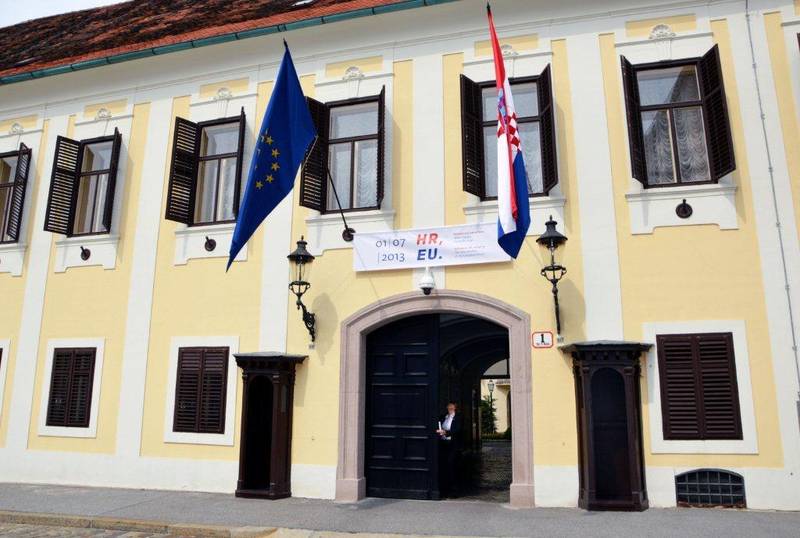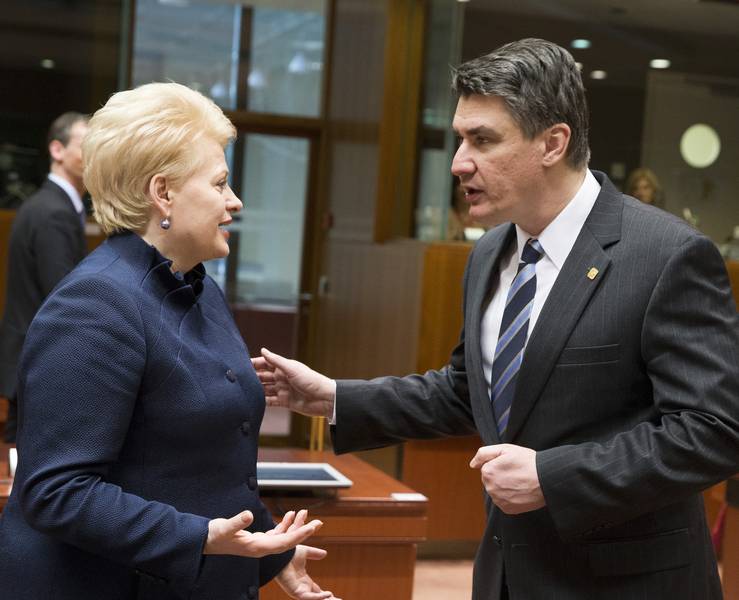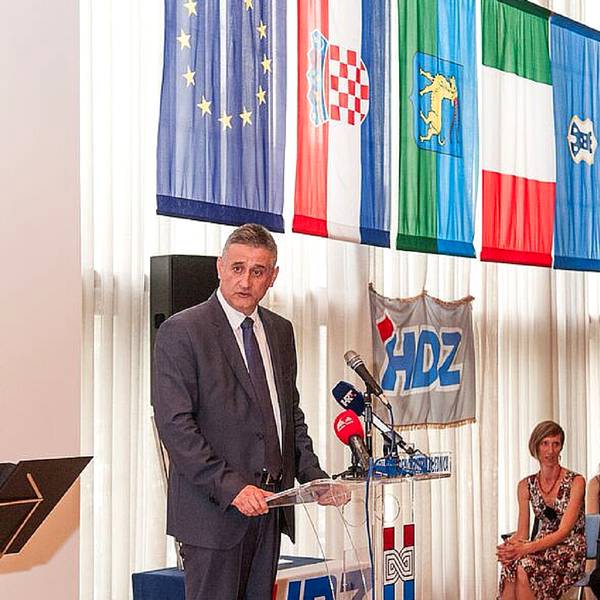Croatia Is Not Greece … Yet
Adelina Marini, July 3, 2015
 On July 1st Croatia marks the second anniversary of its accession to the EU. Hardly an occasion to celebrate in view of the surprising development of the Greek crisis. It is not so much the Croats doubting their decision to join a union on the brink of disintegration but rather because the Croatian public has been pondering whether some, largely German, media are correct to claim Croatia is the second Greece in the EU. Actually, it was not necessary for German media to be voicing this, the Croats themselves had been pondering this question for some time now, lately with increased intensity. What is happening in Greece has been front page news for most national and regional daily and weekly newspapers. It is one of the leading news on TV as well. Reports and analyses range from in-depth information on the situation in Greece to its reflection on Croatia and the Croat economy.
On July 1st Croatia marks the second anniversary of its accession to the EU. Hardly an occasion to celebrate in view of the surprising development of the Greek crisis. It is not so much the Croats doubting their decision to join a union on the brink of disintegration but rather because the Croatian public has been pondering whether some, largely German, media are correct to claim Croatia is the second Greece in the EU. Actually, it was not necessary for German media to be voicing this, the Croats themselves had been pondering this question for some time now, lately with increased intensity. What is happening in Greece has been front page news for most national and regional daily and weekly newspapers. It is one of the leading news on TV as well. Reports and analyses range from in-depth information on the situation in Greece to its reflection on Croatia and the Croat economy.
Populists have no good breeding ground
At first sight many see Croatia following the fate of Greece. There are a number of arguments for this, most of them quite plausible, but there are also differences. The main difference is that Croats are realists and not easily susceptible to populism. They have not yet really confronted the phenomenon as the two largest political parties – left-centrist Social Democratic Party (SDP) that is in power now in coalition with the liberals and one of the pensioners’ parties, and the right Croat Democratic Union (HDZ) - despite their failures are still largely supported by the people. Last year, on the Croatian political sky appeared the star of the Croatian SYRIZA – the movement “Live Wall” that aims to fight the eviction of people who are no longer able to pay their mortgages, whose main leader Vilibor Sincic gathered huge support at the presidential elections in January – 16.42% of votes.
Latest polls, however show a marked decline in support for the ultra-left “Live Wall” and the other centre-left, actually green at its core party ORAH in favour of SDP. According to Crobarometer’s poll of last week, SDP has got the lead on HDZ for the first time. Support for the party of Prime Minister Zoran Milanović is 30.7% and 29.9% for the HDZ-led coalition of the ex-boss of the intelligence agency and ex-minister of interior Tomislav Karamarko. According to the polling agency, HDZ have not suffered a drop, rather SDP have accumulated votes from the other leftist parties, namely “Live Wall” and ORAH, who have 7.4% and 5.1% respectively. The two parties that last year seemed capable of seriously scrambling the deck of political cards in Croatia are slowly but surely losing support.
Everybody is an austerian
Another sign that differentiates Croatia from Greece is the fact that Austerianism is not a dirty word here. Prime Minister Zoran Milanović is a supporter of strict fiscal policy, though his actions prove otherwise. In any case, the government has tried from the beginning of its mandate to adhere to the laws of fiscal discipline, some of which it initiated. Prime Minister Zoran Milanović is in the group of Eastern-European leaders who feel no sympathy for the hardships of the Greek people, especially of its political leaders because they feel their own people are poorer than the Greeks and have no lesser trials to face. Regardless of these views, however, Mr Milanović’s government is unable to lower the budget deficit within the boundaries set by the Stability and Growth Pact. Croatia is now in an excessive deficit procedure that it needs to correct by the year 2016 but is demanding an extension.
According to EU spring forecast, the Croatian budget deficit is expected to reach 5.6% this year and grow to 5.7% next year if current fiscal policy remains. The state’s debt grew significantly over the last few years and especially last year when Croatia introduced the European ESA methodology, which also includes the debts of state-owned enterprises. This year’s forecast for public debt is 90.5% of GDP and for 2016 the EC projects Croatian state debt to reach 93.9% of GDP. Although quite high, this level of debt is on par with the one of France. Croatia was in a 6-year recession until last year but managed to come out of it this year. EC’s expectations are for Croatian economy to rise by 0.3% in 2015 and GDP is expected to swell by 1.2%.
Unemployment in Croatia is also a problem. It is among the highest in the EU – 17.0% and in youth unemployment Croatia ranks after Greece and Spain. Croatia has for the first time joined the European Semester last year, as the Semester started covering candidate countries only from this year. The first country-specific recommendations and the accompanying economic analysis showed a very clear picture of what is wrong with the Croatian economy – over-regulation, closed labour market, high tax  burden over labour and business both, and consumption. VAT in Croatia is 25% with exceptions for tourism, bread, and milk.
burden over labour and business both, and consumption. VAT in Croatia is 25% with exceptions for tourism, bread, and milk.
The 2015 report shows Croatia is working on the recommendations but very slowly. A labour market reform was started but the EC says that its effect is yet to be seen. Reforms have been started to deal with VAT fraud and low tax collection. The Croatian example in tax collection is very good for Greece which suffers chronic low collection rate. The government instituted for the first time the system of cash receipts – the so called fiscalisation – in the middle of its term. This happened at the peak of tourist season. It should be noted that tourism in Croatia, like in Greece, accounts for a large portion of GDP and is an important source of income. The minister of finance at the time, Slavko Linić, introduced the law with extreme severity, with seaside establishments being closed at the peak of season for just a few Euro discrepancies between what the electronic cash register is showing and what is really there.
As a result just two years later it is a rarity in Croatia not to get a receipt and the law is if you don’t get one you have the right not to pay your bill. This shows how much can be achieved by having the political will. Besides that, Croatia has a persistent problem with wage adjustment. According to the EC, the system of determining wages is not flexible and not adapted to the macroeconomic environment. The huge discrepancy between wages in private and public sector is an extreme weakness, according to the EC. Collective bargaining is not transparent and must change. The business environment in the country also suffers from serious institutional shortcomings, including regulation instability, weak legislative quality control, discriminatory practises, and a plethora of parafiscal charges. There is a lack of transparency and predictability in the working of administrative bodies. The EC thinks the new anti-corruption strategy lacks focus and a sufficient level of detail. Unlike Greece, however, Croatia is the first country in the region to have an ex-prime minister sentenced to prison for corruption, along with many high-ranking officials, even a whole political party.
The analysis of the IMF is much more lenient toward Croatia than that of the Commission. In the IMF's mission report of 2 July the Croatian authorities are actually commended for the structural reforms they implemented. And although the IMF agrees with many of the EC conclusions, its experts believe macroeconomic and financial risks seem largely contained because the government covers more than 80% of its financial needs from domestic sources, especially banks. Risks of capital outflows and currency instability are contained thanks to prudential regulation.
Croatia is still far from the Greek scenario
All significant political players as a whole are defending a strict fiscal discipline, with the exception of “Live Wall”. The most talked-about subject in Croatian public domain is the HDZ economic program that will be officially presented as soon as a date is set for the parliamentary elections. There have been several leaks of details in media. They show the coalition is steadfast on following-through with the reforms that several previous governments postponed. Many of those reforms are painful. Among them is one of last year’s recommendations of the EC, dropped from this year’s Semester – appointments in the administration are to be made on the basis of merit, not on partisan principle. This is still a big problem in Croatia. All bosses of state-owned or partly state-owned companies are appointed by party membership principle.
HDZ leader Tomislav Karamarko said this spring that Croatia must pass through “the valley of tears”. Alas, Croats believe less and less in pre-election programs. One of the mass daily papers 24 sata published a critical piece on the economic program, saying it contained nothing new. “A program of repetitions” is the heading of the text in the newspaper that says every summer TV channels air re-runs of movies, series, and news aired over the year to fill-up their vacation-time program. Likewise, parties re-heat the same program every four years and they don’t even keep it. According to the newspaper, Croatia will be learning the Greek lessons for years to come.
“What did we learn after Greece? We know it is devastating to give and take money that cannot be repaid. We learned that the control measures of Brussels are super-weak. We know that a lot of member countries of the EU cannot cope with budget discipline. We know it is difficult and expensive to make reforms but it is more difficult and more expensive not to start them. We know that large sporting events (the Greeks put a black shroud over the Olympic games as well) are not for poor countries. We know that interweaving geopolitics and economics is deadly. The Greeks were accepted in the EU so they do not go to the Russians. They were given money so they do not end up in a dictatorship. We know all that. We just don’t know where the exit is and are we going to be smarter”, says a 24 sata editorial.
At the moment Greece or an upcoming Greek scenario for Croatia is the leading subject of discussion. In it joined President Kolinda Grabar-Kitarović by summoning her economic council and urged for a change in mentality both in institutions and citizens. Without it there will be no jobs, she said. According to ex-Minister of Finance of Croatia from the HDZ government Martina Dalić, the problem in Croatia is lack of trust in market economy. Such distrust is shared by almost all political parties. In an interview for the newest newspaper in Croatian media market Telegram she identified as another problem the fact that a large part of home-economists’ ideas and proposals are stuck somewhere in the  60’s of the last century or even earlier. Another serious problem is that reforms in Croatia are just mimicked, not followed through, she explained
60’s of the last century or even earlier. Another serious problem is that reforms in Croatia are just mimicked, not followed through, she explained
Regardless of the many similarities the differences between Greece and Croatia prevail. Many of them are due to the harder accession process that Croatia went through. It was the first country after the last big enlargement that ended with Bulgaria and Romania on January 1st 2007, for which much stricter requirements for accession were imposed. It was not until after Croatia’s accession, though, that the EC finally paid attention to the severe economic problems of candidate countries. It is important to note that Croatia is a relatively young country compared to the rest of the EU members. It is at the tender age of just over 20 years old, during which it had to develop institutions, recuperate from the war, and lead negotiations with the EU. Such transformation over such a short period of time is a challenge to the economy.
The most important difference between Greece and Croatia, though, is the Croats are aware they have a problem and this problem is from within, not brought in. Although a large portion of Croatian society suffers from a sort of Euroscepticism it is rarely heard that the EU is part of Croatia’s problems. One more thing, Croatia with the European Semester and its much harder accession is already under the EU’s strict supervision. In the 2015 report on the European Semester the EC recognises that the Croatian government expresses disagreement with some recommendations and positions of the EC but there is constructive dialogue with Zagreb. Something that cannot be said about the government of Alexis Tsipras.
If the HDZ come into power it is very likely this quality of dialogue with Brussels will continue, least of all because its party is a member of EPP where German Chancellor Angela Merkel has strong influence. And Germany is an example to Croats. If the HDZ drops the idea of turning to far-right with nationalist rhetoric and focuses on the economy as in the first round of the presidential elections it is very likely this will be the leading subject of the election campaign. Then the Croats would be facing a more rational choice – whether it really is the time to pass through the valley of tears, or play the Greek scenario. If they choose the latter, though, they must know well that they are not part of the Eurozone and it is unlikely they will have many allies.
Translated by Stanimir Stoev
 Kolinda Grabar-Kitarovic | © KGK
Kolinda Grabar-Kitarovic | © KGK Jozo Rados | © European Parliament
Jozo Rados | © European Parliament Aleksandar Vucic, Andrej Plenkovic | © Vlada RH
Aleksandar Vucic, Andrej Plenkovic | © Vlada RH